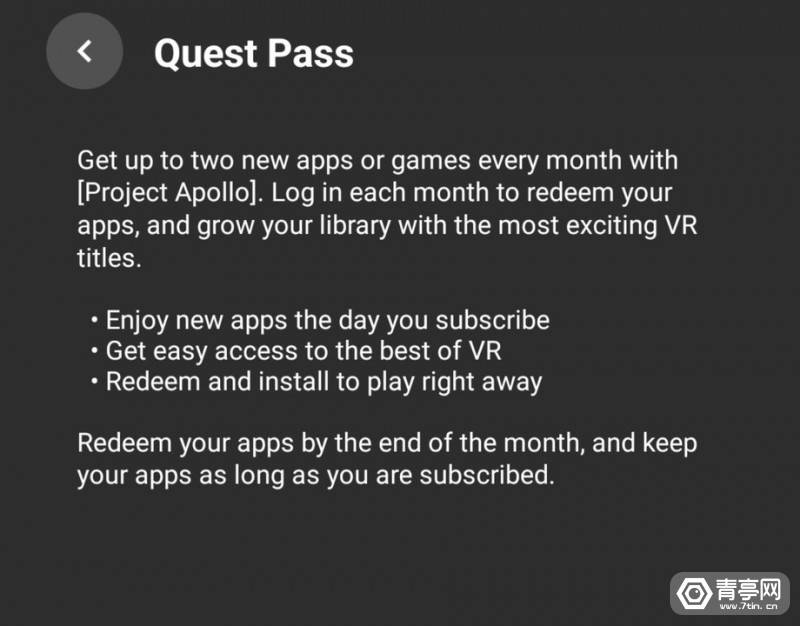Eddie-Griffin
Banned
https://www.sohu.com/a/650757091_395737

So you are going to get two free games or VR apps, possibly a mix of both as well, every month, and as long as you stay subscribed, you will continue to keep the games or VR apps you got for free. Which will build-up your collection.
It's a pretty big idea for VR, and could end up being a hit for some people. The only issue is that you are starting with a lot of free content and then having more free content added over time like Game Pass does. You are instead going to see two free Apps and/or games, and if you don't care for them you have to wait for only TWO more games the next month, so that sub may keep some people interested, but it also limits what choice there is. Game Pass has a lot of games, including games you may never drive without the sub, you don't start with zero library and two games(or apps) are added every month.
But it is a very interesting idea to improve retention and software in the VR space. Maybe they might increase the amount of games as they are working on this program since it hasn't been announced yet.
I believe Quest 2 users will be able to use this when it comes out, but I have a feeling they won't announce the program until they reveal the Quest 3. Maybe the Quest 3 will have a better version of this program to incentivize adoption (same for the cheaper Ventura headset.)
But being the "Game Pass of VR" is quite an interesting idea that may end up working well for VR adoption depending on how it's executed.
Is Zucker learning lessons and actually adapting? I am shocked. Kudos.
On March 7th, Twitter netizen sire在 discovered in the Meta Quest Android application that Meta is suspected of preparing a VR game subscription service, code-named Project Apollo, and its official name may be "Quest Pass". It is reported that the service may give users two new VR applications or VR games every month. According to Quagsire, after opening the deep link oculus://view/platform_subscription on a mobile device, you can jump to the Apollo introduction interface of the Quest application. It is worth noting that another netizen also found this interface in the Quest application on the iOS side.
According to Qingting.com, the initial strategy of the Quest store was to attract users by subsidizing hardware, and then sell content such as VR games to users to make money. In contrast, HTC Vive's strategy is not to substantially subsidize VR hardware, but to reduce the cost of purchasing VR games through the Viveport content subscription service. We know that Quest is already a very successful VR application store, which has made several VR games achieve millions or even tens of millions of dollars in revenue. However, considering the massive investment Meta has made in promoting the Quest store, it may still be The expected revenue maximization was not realized.
Previously, former Reality Labs consultant CTO John Carmack revealed that after purchasing Quest 2, many people mainly play free games (App Lab or SideQuest) or stream PC VR games (SteamVR), which obviously avoids using Quest. Store to buy content. So later, under the pressure of revenue, Meta reduced the hardware subsidy for Quest 2 (the price increased by $100). Next, if the Quest store launches a subscription service, it may be expected to bring greater price advantages to VR games and even increase user stickiness.
However, it is not sure how far Project Apollo has progressed. It is speculated that since Meta and Microsoft have already established cooperation (for example, Xbox Cloud Gaming supports Quest 2), the service may be jointly developed by Microsoft and Meta

So you are going to get two free games or VR apps, possibly a mix of both as well, every month, and as long as you stay subscribed, you will continue to keep the games or VR apps you got for free. Which will build-up your collection.
It's a pretty big idea for VR, and could end up being a hit for some people. The only issue is that you are starting with a lot of free content and then having more free content added over time like Game Pass does. You are instead going to see two free Apps and/or games, and if you don't care for them you have to wait for only TWO more games the next month, so that sub may keep some people interested, but it also limits what choice there is. Game Pass has a lot of games, including games you may never drive without the sub, you don't start with zero library and two games(or apps) are added every month.
But it is a very interesting idea to improve retention and software in the VR space. Maybe they might increase the amount of games as they are working on this program since it hasn't been announced yet.
I believe Quest 2 users will be able to use this when it comes out, but I have a feeling they won't announce the program until they reveal the Quest 3. Maybe the Quest 3 will have a better version of this program to incentivize adoption (same for the cheaper Ventura headset.)
But being the "Game Pass of VR" is quite an interesting idea that may end up working well for VR adoption depending on how it's executed.
Is Zucker learning lessons and actually adapting? I am shocked. Kudos.
Last edited:

